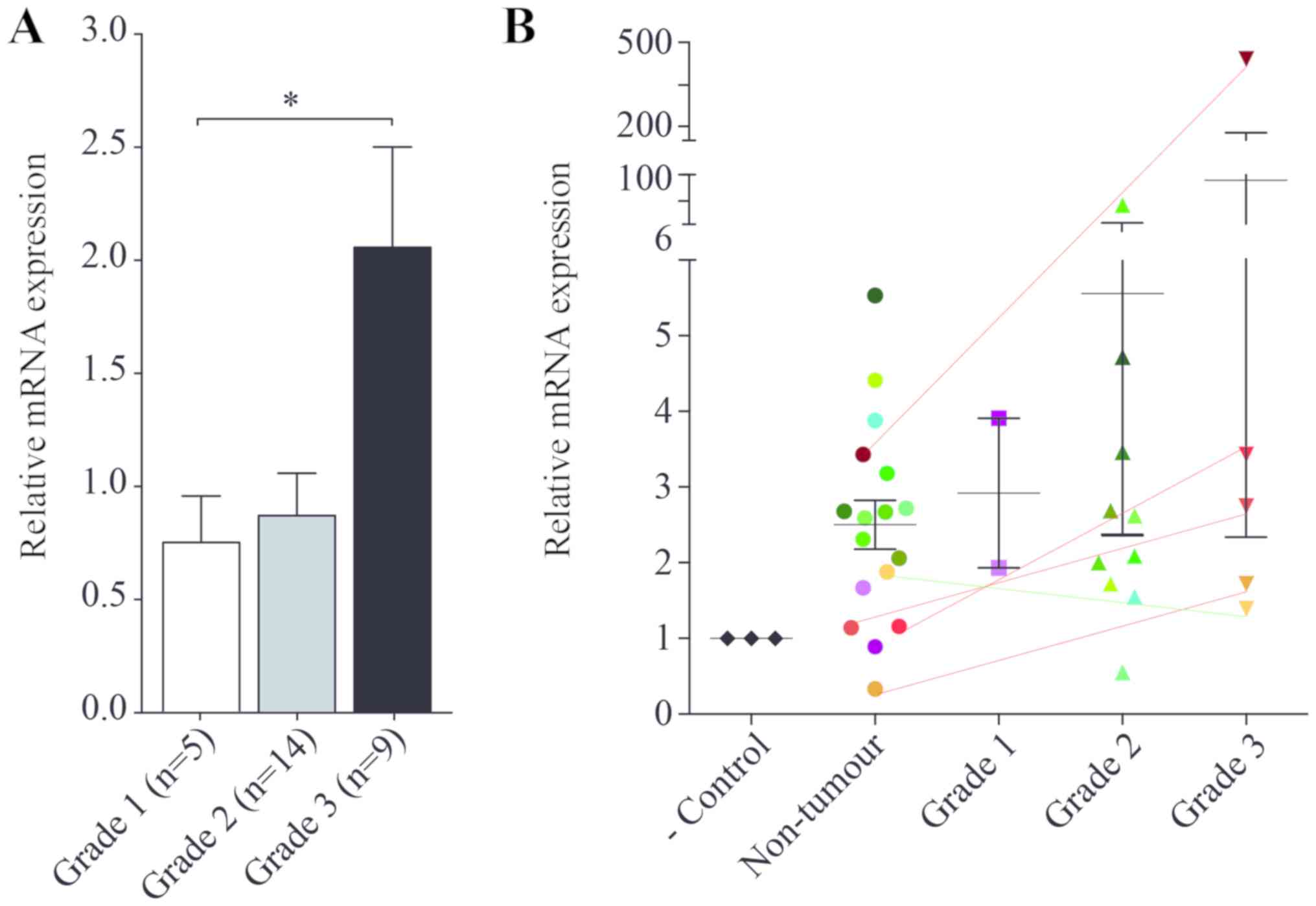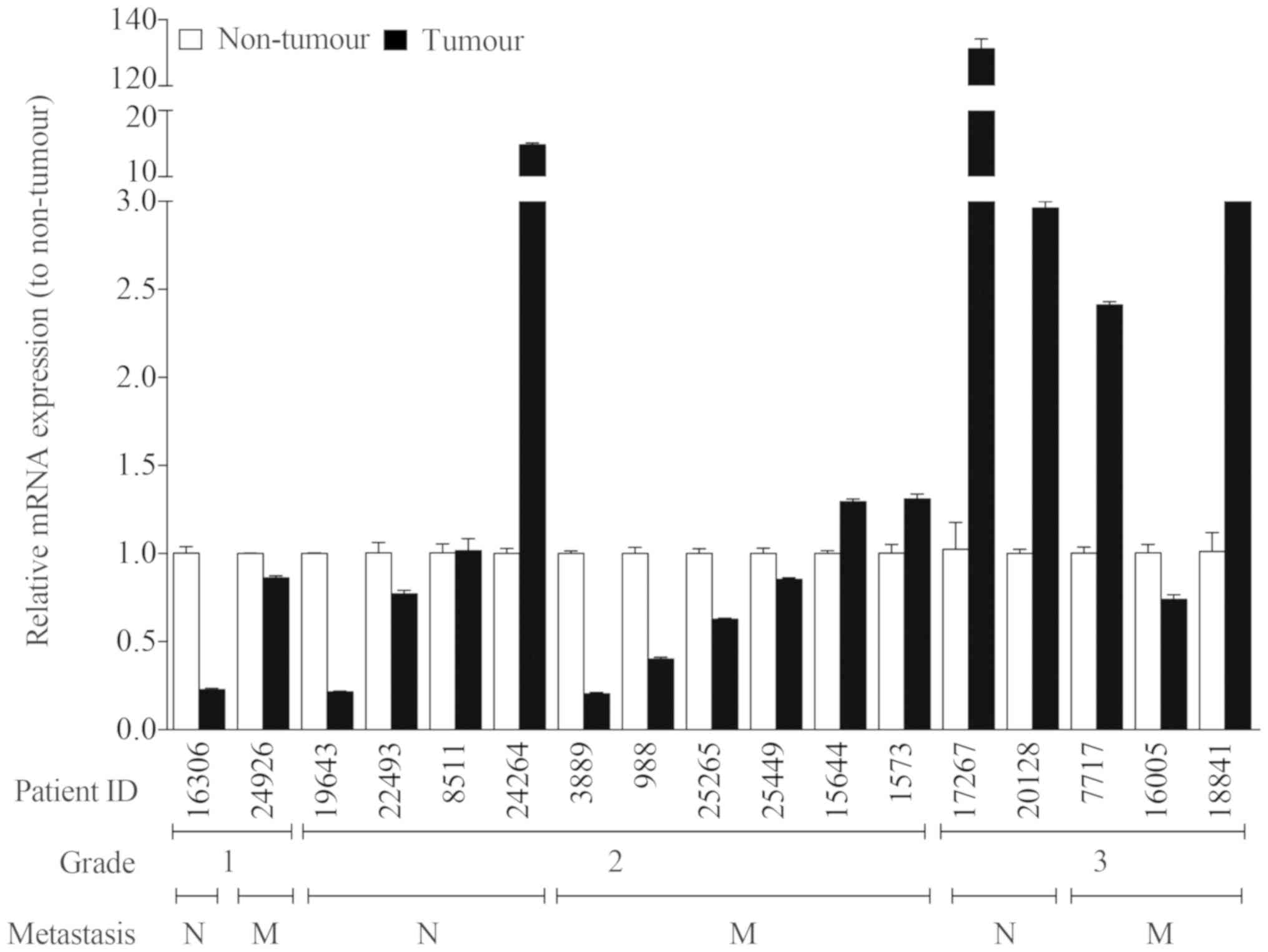|
1
|
Bray F, Ferlay J, Soerjomataram I, Siegel
RL, Torre LA and Jemal A: Global cancer statistics 2018: GLOBOCAN
estimates of incidence and mortality worldwide for 36 cancers in
185 countries. CA Cancer J Clin. 68:394–424. 2018. View Article : Google Scholar : PubMed/NCBI
|
|
2
|
Curado MP, Edwards B, Shin HR, Storm H,
Ferlay J, Heanue M and Boyle P: Cancer incidence in five
continents. 9. IARC Press; Lyon, France: 2007
|
|
3
|
Jemal A, Center MM, DeSantis C and Ward
EM: Global patterns of cancer incidence and mortality rates and
trends. Cancer Epidemiol Biomarkers Prev. 19:1893–1907. 2010.
View Article : Google Scholar : PubMed/NCBI
|
|
4
|
Ferlay J, Steliarova-Foucher E,
Lortet-Tieulent J, Rosso S, Coebergh JW, Comber H, Forman D and
Bray F: Cancer incidence and mortality patterns in Europe:
Estimates for 40 countries in 2012. Eur J Cancer. 49:1374–1403.
2013. View Article : Google Scholar : PubMed/NCBI
|
|
5
|
Guo P, You JO, Yang J, Jia D, Moses MA and
Auguste DT: Inhibiting metastatic breast cancer cell migration via
the synergy of targeted, pH-triggered siRNA delivery and chemokine
axis blockade. Mol Pharm. 11:755–765. 2014. View Article : Google Scholar : PubMed/NCBI
|
|
6
|
Elston CW and Ellis IO: Assessment of
histological grade. The breast. 13. Churchill Livingstone;
Edinburgh-New York: pp. 356–384. 1998
|
|
7
|
Hanahan D and Weinberg RA: Hallmarks of
cancer: The next generation. Cell. 144:646–674. 2011. View Article : Google Scholar : PubMed/NCBI
|
|
8
|
Leal JF, Fominaya J, Cascón A, Guijarro
MV, Blanco-Aparicio C, Lleonart M, Castro ME, Ramon Y Cajal S,
Robledo M, et al: Cellular senescence bypass screen identifies new
putative tumor suppressor genes. Oncogene. 27:1961–1970. 2008.
View Article : Google Scholar : PubMed/NCBI
|
|
9
|
López-Vicente L, Armengol G, Pons B, Coch
L, Argelaguet E, Lleonart M, Hernández-Losa J, de Torres I, Ramon Y
and Cajal S: Regulation of replicative and stress-induced
senescence by RSK4, which is down-regulated in human tumors. Clin
Cancer Res. 15:4546–4553. 2009. View Article : Google Scholar : PubMed/NCBI
|
|
10
|
López-Vicente L, Pons B, Coch L, Teixidó
C, Hernández-Losa J, Armengol G, Ramon Y and Cajal S: RSK4
inhibition results in bypass of stress-induced and oncogene-induced
senescence. Carcinogenesis. 32:470–476. 2011. View Article : Google Scholar : PubMed/NCBI
|
|
11
|
Rowinsky EK: Signal events: Cell signal
transduction and its inhibition in cancer. Oncologist (3 Suppl 8).
S5–S17. 2003. View Article : Google Scholar
|
|
12
|
Wade PA: Transcriptional control at
regulatory checkpoints by histone deacetylases: Molecular
connections between cancer and chromatin. Hum Mol Genet.
10:693–698. 2001. View Article : Google Scholar : PubMed/NCBI
|
|
13
|
Zhang J, Wu LY, Zhang XS and Zhang S:
Discovery of co-occurring driver pathways in cancer. BMC
Bioinformatics. 15:2712014. View Article : Google Scholar : PubMed/NCBI
|
|
14
|
Schones DE and Zhao K: Genome-wide
approaches to studying chromatin modifications. Nat Rev Genet.
9:179–191. 2008. View
Article : Google Scholar : PubMed/NCBI
|
|
15
|
Jones PA, Issa JP and Baylin S: Targeting
the cancer epigenome for therapy. Nat Rev Genet. 17:630–641. 2016.
View Article : Google Scholar : PubMed/NCBI
|
|
16
|
Hutchinson L: Breast cancer: Challenges,
controversies, breakthroughs. Nat Rev Clin Oncol. 7:669–670. 2010.
View Article : Google Scholar : PubMed/NCBI
|
|
17
|
Kim TW, Kim YJ, Lee HJ, Min SY, Kang HS
and Kim SJ: Hs.137007 is a novel epigenetic marker hypermethylated
and up-regulated in breast cancer. Int J Oncol. 36:1105–1111. 2010.
View Article : Google Scholar : PubMed/NCBI
|
|
18
|
Khirade MF, Lal G and Bapat SA: Derivation
of a fifteen gene prognostic panel for six cancers. Sci Rep.
5:132482015. View Article : Google Scholar : PubMed/NCBI
|
|
19
|
Jeong G, Bae H, Jeong D, Ham J, Park S,
Kim HW, Kang HS and Kim SJ: A Kelch domain-containing KLHDC7B and a
long non-coding RNA ST8SIA6-AS1 act oppositely on breast cancer
cell proliferation via the interferon signaling pathway. Sci Rep.
8:129222018. View Article : Google Scholar : PubMed/NCBI
|
|
20
|
Guo P, Wang D, Wu J, Yang J, Ren T, Zhu B
and Xiang Y: The landscape of alternative splicing in cervical
squamous cell carcinoma. Onco Targets Ther. 8:73–79. 2014.
View Article : Google Scholar : PubMed/NCBI
|
|
21
|
NCBI Unigene: Hs.137007-Kelch domain
containing 7B (KLHDC7B). http://www.ncbi.nlm.nih.gov/UniGene/clust.cgi?UGID=150709&TAXID=9606&SEARCH=Hs.137007December.
2018
|
|
22
|
Hung-Chun Y: Comparative and functional
genomics study of the telomeric 7.73-Mb region from marker D22S418
through D22S1726 on human chromosome 22. UMI Dissertations
Publishing. 2008.ISBN 9780549576495 (pag 74, 75).
|
|
23
|
NCBI Reference Sequence: Kelch
domain-containing protein 7B [Homo sapiens]. https://www.ncbi.nlm.nih.gov/protein/NP_612442December.
2018
|
|
24
|
Laird PW: Cancer epigenetics. Hum Mol
Genet. 1:R65–R76. 2005. View Article : Google Scholar
|
|
25
|
Nabilsi NH, Broaddus RR and Loose DH: DNA
methylation inhibits p53-mediated survivin repression. Oncogene.
28:2046–2050. 2009. View Article : Google Scholar : PubMed/NCBI
|
|
26
|
Cox GS, Gutkin DW, Haas MJ and Cosgrove
DE: Isolation of an Alu repetitive DNA binding protein and effect
of CpG methylation on binding to its recognition sequence. Biochim
Biophys Acta. 1396:67–87. 1998. View Article : Google Scholar : PubMed/NCBI
|
|
27
|
Dobbelstein M and Moll U: Targeting
tumour-supportive cellular machineries in anticancer drug
development. Nat Rev Drug Discov. 13:179–196. 2014. View Article : Google Scholar : PubMed/NCBI
|
|
28
|
Issa JP: DNA methylation as a therapeutic
target in cancer. Clin Cancer Res. 13:1634–1637. 2007. View Article : Google Scholar : PubMed/NCBI
|
|
29
|
UniProtKB: Q96G42 (KLD7B_HUMAN), .
http://www.uniprot.org/uniprot/Q96G42December.
2018
|
|
30
|
Hara T, Ishida H, Raziuddin R, Dorkhom S,
Kamijo K and Miki T: Novel kelch-like protein, KLEIP, is involved
in actin assembly at cell-cell contact sites of Madin-Darby canine
kidney cells. Mol Biol Cell. 15:1172–1184. 2004. View Article : Google Scholar : PubMed/NCBI
|
|
31
|
Stogios PJ and Privé GG: The BACK domain
in BTB-kelch proteins. Trends Biochem Sci. 29:634–637. 2004.
View Article : Google Scholar : PubMed/NCBI
|
|
32
|
Mantzouranis L, Bagattini R and Souza GM:
KeaA, a Dictyostelium Kelch-domain protein that regulates the
response to stress and development. BMC Dev Biol. 10:792010.
View Article : Google Scholar : PubMed/NCBI
|
|
33
|
Taguchi K, Motohashi H and Yamamoto M:
Molecular mechanisms of the Keap1-Nrf2 pathway in stress response
and cancer evolution. Genes Cells. 16:123–140. 2011. View Article : Google Scholar : PubMed/NCBI
|
|
34
|
Gupta VA and Beggs AH: Kelch proteins:
Emerging roles in skeletal muscle development and diseases. Skelet
Muscle. 4:112014. View Article : Google Scholar : PubMed/NCBI
|
|
35
|
Sesé M, Fuentes P, Esteve-Codina A, Béjar
E, McGrail K, Thomas G, Aasen T, Ramón Y and Cajal S:
Hypoxia-mediated translational activation of ITGB3 in breast cancer
cells enhances TGF-β signaling and malignant features in vitro and
in vivo. Oncotarget. 8:114856–114876. 2017. View Article : Google Scholar : PubMed/NCBI
|
|
36
|
Hevir N, Trošt N, Debeljak N and Rižner
TL: Expression of estrogen and progesterone receptors and estrogen
metabolizing enzymes in different breast cancer cell lines. Chem
Biol Interact. 191:206–216. 2011. View Article : Google Scholar : PubMed/NCBI
|
|
37
|
Woods Ignatoski KM, Dziubinski ML,
Ammerman C and Ethier SP: Cooperative interactions of HER-2 and
HPV-16 oncoproteins in the malignant transformation of human
mammary epithelial cells. Neoplasia. 7:788–798. 2005. View Article : Google Scholar : PubMed/NCBI
|
|
38
|
Lim LY, Vidnovic N, Ellisen LW and Leong
CO: Mutant p53 mediates survival of breast cancer cells. Br J
Cancer. 101:1606–1612. 2009. View Article : Google Scholar : PubMed/NCBI
|
|
39
|
Dai X, Cheng H, Bai Z and Li J: Breast
cancer cell line classification and its relevance with breast tumor
subtyping. J Cancer. 8:3131–3141. 2017. View Article : Google Scholar : PubMed/NCBI
|
|
40
|
Jiang G, Zhang S, Yazdanparast A, Li M,
Pawar AV, Liu Y, Inavolu SM and Cheng L: Comprehensive comparison
of molecular portraits between cell lines and tumors in breast
cancer. BMC Genomics. 7 (Suppl 17):S5252016. View Article : Google Scholar
|
|
41
|
Livak KJ and Schmittgen TD: Analysis of
relative gene expression data using real-time quantitative PCR and
the 2(-Delta Delta C(T)) method. Methods. 25:402–408. 2001.
View Article : Google Scholar : PubMed/NCBI
|
|
42
|
Veronese SM, Gambacorta M, Gottardi O,
Scanzi F, Ferrari M and Lampertico P: Proliferation index as a
prognostic marker in breast cancer. Cancer. 71:3926–3931. 1993.
View Article : Google Scholar : PubMed/NCBI
|
|
43
|
van Diest PJ, van der Wall E and Baak JP:
Prognostic value of proliferation in invasive breast cancer: A
review. J Clin Pathol. 57:675–681. 2004. View Article : Google Scholar : PubMed/NCBI
|
|
44
|
Patani N, Martin LA and Dowsett M:
Biomarkers for the clinical management of breast cancer:
International perspective. Int J Cancer. 133:1–13. 2013. View Article : Google Scholar : PubMed/NCBI
|
|
45
|
Li CI, Uribe DJ and Daling JR: Clinical
characteristics of different histologic types of breast cancer. Br
J Cancer. 93:1046–1052. 2005. View Article : Google Scholar : PubMed/NCBI
|
|
46
|
Gry M, Rimini R, Strömberg S, Asplund A,
Pontén F, Uhlén M and Nilsson P: Correlations between RNA and
protein expression profiles in 23 human cell lines. BMC Genomics.
10:3652009. View Article : Google Scholar : PubMed/NCBI
|

















